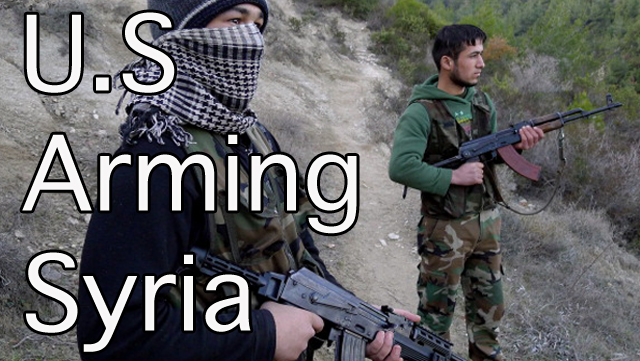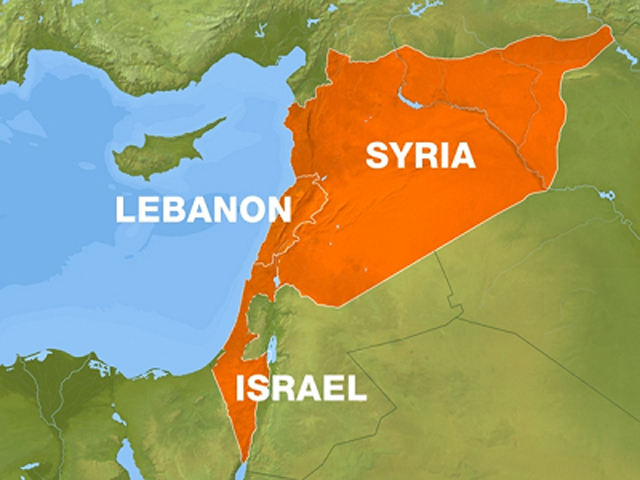
Members of the Free Syrian Army
President Obama has finally done it. After some long-winded hesitation, the United States is officially going to provide arms to rebels fighting Syrian President Bashar al-Assad. This is a huge policy shift after the White House said it had confirmed that Damascus used chemical weapons in the country’s civil war, effectively crossing Obama’s sacred red line. But…is this a good idea? Really?
We get it. The massive humanitarian crisis that has come as a result of Syria’s devastating civil war needs to be remedied and standing on the side-lines raises moral questions. In fact, President Obama has received a lot of criticism for not doing something sooner. According to latest estimates, at least 90,000 people have died and millions have sought safety in refugee camps in neighboring countries (interesting that although almost 100,000 people have tragically lost their lives, the only reason the United States is getting involved now is because 100 of those were killed by chemical weapons. Is dying from inhaling sarin worse than dying from a bomb explosion? I digress….).
Syria has literally become the world’s worst humanitarian crisis and the incessant fighting continues. Massacres, shelling, and senseless acts of violence continue to ravage through the war-torn country while President al-Assad holds tightly yet unsustainably to power. With this in mind, it would make sense for the U.S to help the people trying to topple over a dictator who has been killing his own citizens. We did it in Iraq. We did it in Libya. Why not do it in Syria?
It’s not that simple. In fact, what we have on our hands is a political catch-22 because Syria’s civil war is not just about Syria. If you think of Syria’s conflict as a bucket filling with water — the water has overflowed way over its borders drowning the bucket and other involved parties in a large, messy, pool. Russia, Lebanon, Iran, Hezbollah, al-Qaeda among others, are all swimming in Syria’s crisis and the U.S — who had been merely dipping it toes — has taken a plunge. But is it too late?
Here are five reasons why arming rebels may blow up in our faces:
1. Weapons Could Land into the Hands of Religious Extremists

So…Al-Qaeda and the United States are on the same side. Grab your attention? Exactly.
The conflict never started out as religious but the vacuum of support in the rebel’s fight has attracted extremism. It’s important to keep in mind that Syria’s opposition is not a unified force but an umbrella of rebel groups. The Free Syrian Army — Syria’s main opposition group — is independent and is not linked to any form of religious extremism.
Having said that, a few of opposition groups are linked and have been armed by Al-Qaeda. Although the United States has made it clear that weapons would go directly to trusted opposition groups, how can they control it? What if U.S weapons fall into the hands of al-Qaeda-linked factions or other religious extremists?
2. Meanwhile, Russia Is Arming al-Assad

Russia has been one of President al-Assads biggest international allies, in fact Putin’s government has sent missiles and other arms in Assad’s crack-down against rebels. In other words, U.S weapons will be fighting against Russian weapons pivoting the United States (once again…) against its historic soviet enemy.
3. Hezbollah and Iran are Fighting Against the Rebels

Hezbollah soldiers
We may be on the same side as al-Qaeda but we’re fighting against Hezbollah in this conflict. 5,000 Hezbollah guerrillas are propping up Assad’s forces. In fact, Assad’s recent military successes near the Lebanese border have been linked to the Islamic militant group.
Iran has also been sending fighters to battle against the rebels. Mustafa Alani, director of security and defense at the Dubai-based Gulf Research Council has stated:
“This is an Iranian fight. It is no longer a Syrian one. The issue is hegemony in the region.”
With Iran’s recent presidential elections and the end of Ahmedinejad, there has been hope for U.S and Iranian relationships to improve. However, with U.S involvement, could this worsen relationships with Iran?
By allying itself with rebels, U.S is involved in a war against Russia, Hezbollah and Iran. It is no secret that Hezbollah and Iran dislike the West and I think we can agree that their anti-West sentiment wont get any better once their fighters are met with U.S weapons.
4. Ethnic Tension in the War Might Lead to a Genocide

Screen grab from explicit video brought to light by the Human Rights Watch
This isn’t only a story between a political opposition fighting against a government. This has become sectarian. Just a few months ago, a shocking video made its way onto the internet. It’s content: A Syrian rebel fighter eating the heart of the dead body of a government soldier at his feet. While he mutilated the body, the Syrian rebel announced his hate towards the Alawites, a ethnic minority in Syria. The fact that President Assad is an Alawite in a country with a 80% Sunni majority, has sparked ethnic tensions. In fact, other ethnic minorities have allied themselves with Assad as there is a growing fear of what could happen if a Sunni majority gets into power.
Could there be ethnic cleansing? Would the U.S be linked to helping this new and potentially conflicted government get into power?
5. Weapons Could Be Used Against Israel

How is Israel Going to feel About US sending weapons to a hostile Muslim nation on its border? Israel is very much against Assad (He did say he wanted to unite war torn Syria against Israel and he is linked to long-time Israeli enemy Hezbollah) and having him out of power would be definitely a plus. In fact, a key figure in the Free Syrian Army has hinted at peace with Israel when he said in an interview “If Israel decides to abandon Assad he is finished. The Syrian people would not forget this gesture.”
But Syria’s fighting has been encroaching on Israel’s borders and there is no way to know that weapons wont be used against Israel.
Also, what will happen if theocrats get into power? Assad has been able to do little against Israel since he is busy trying to run a country in ruins. If the country stabilizes under more extremist rule and peace if not reached, Israel — a key U.S ally — would have a strengthened enemy (with U.S weapons) on its border.
Syria needs a solution. Hopefully U.S weapons will be used correctly in the fight against Assad and the country will finally find peace under a stabilized transitional government. But what if it doesn’t?
